 by Steven M. Gillon. In this fresh take on John F. Kennedy's assassination, history professor Gillon probes the chaos that surrounded Vice President Johnson's ascension to power as he coped with both the trauma of Kennedy's murder and the enmity of Kennedy's inner circle. At Parkland Hospital in Dallas, a battle of wills between Johnson and JFK's inner circle-including appointments secretary Kenneth O'Donnell and military aide Brigadier General Godfrey McHugh-contributed to the confusion then (and now) over the timeline of Kennedy's death and Johnson's assuming the presidency. Leading the anti-Johnson contingent was the president's brother, Attorney General Robert Kennedy, who tussled with LBJ over the swearing-in details (both disagreed bitterly about the episode afterwards). Johnson faltered as he moved into the spotlight, trying in vain to adopt Camelot as his own by trying (unsuccessfully) to console Jackie and persuading (with varying degrees of success) Kennedy staffers to stay on. Gillon captures the two faces of Johnson-the insecure second-guesser and the brilliant politician-as well as the earliest signs of the Johnson presidency's eventual failure. (Check catalog)
by Steven M. Gillon. In this fresh take on John F. Kennedy's assassination, history professor Gillon probes the chaos that surrounded Vice President Johnson's ascension to power as he coped with both the trauma of Kennedy's murder and the enmity of Kennedy's inner circle. At Parkland Hospital in Dallas, a battle of wills between Johnson and JFK's inner circle-including appointments secretary Kenneth O'Donnell and military aide Brigadier General Godfrey McHugh-contributed to the confusion then (and now) over the timeline of Kennedy's death and Johnson's assuming the presidency. Leading the anti-Johnson contingent was the president's brother, Attorney General Robert Kennedy, who tussled with LBJ over the swearing-in details (both disagreed bitterly about the episode afterwards). Johnson faltered as he moved into the spotlight, trying in vain to adopt Camelot as his own by trying (unsuccessfully) to console Jackie and persuading (with varying degrees of success) Kennedy staffers to stay on. Gillon captures the two faces of Johnson-the insecure second-guesser and the brilliant politician-as well as the earliest signs of the Johnson presidency's eventual failure. (Check catalog)
Friday, December 18, 2009
The Kennedy assassination--24 hours after : Lyndon B. Johnson's pivotal first day as president
 by Steven M. Gillon. In this fresh take on John F. Kennedy's assassination, history professor Gillon probes the chaos that surrounded Vice President Johnson's ascension to power as he coped with both the trauma of Kennedy's murder and the enmity of Kennedy's inner circle. At Parkland Hospital in Dallas, a battle of wills between Johnson and JFK's inner circle-including appointments secretary Kenneth O'Donnell and military aide Brigadier General Godfrey McHugh-contributed to the confusion then (and now) over the timeline of Kennedy's death and Johnson's assuming the presidency. Leading the anti-Johnson contingent was the president's brother, Attorney General Robert Kennedy, who tussled with LBJ over the swearing-in details (both disagreed bitterly about the episode afterwards). Johnson faltered as he moved into the spotlight, trying in vain to adopt Camelot as his own by trying (unsuccessfully) to console Jackie and persuading (with varying degrees of success) Kennedy staffers to stay on. Gillon captures the two faces of Johnson-the insecure second-guesser and the brilliant politician-as well as the earliest signs of the Johnson presidency's eventual failure. (Check catalog)
by Steven M. Gillon. In this fresh take on John F. Kennedy's assassination, history professor Gillon probes the chaos that surrounded Vice President Johnson's ascension to power as he coped with both the trauma of Kennedy's murder and the enmity of Kennedy's inner circle. At Parkland Hospital in Dallas, a battle of wills between Johnson and JFK's inner circle-including appointments secretary Kenneth O'Donnell and military aide Brigadier General Godfrey McHugh-contributed to the confusion then (and now) over the timeline of Kennedy's death and Johnson's assuming the presidency. Leading the anti-Johnson contingent was the president's brother, Attorney General Robert Kennedy, who tussled with LBJ over the swearing-in details (both disagreed bitterly about the episode afterwards). Johnson faltered as he moved into the spotlight, trying in vain to adopt Camelot as his own by trying (unsuccessfully) to console Jackie and persuading (with varying degrees of success) Kennedy staffers to stay on. Gillon captures the two faces of Johnson-the insecure second-guesser and the brilliant politician-as well as the earliest signs of the Johnson presidency's eventual failure. (Check catalog)
Tuesday, December 8, 2009
1938 : Hitler's gamble
 by Giles Macdonogh. Might-have-beens haunt this insightful narrative of a watershed in the history of Nazi Germany. MacDonogh (After the Reich) chronicles milestones in the development of a radicalized, expansionist Third Reich in the year 1938: the forcible annexation of Austria and the Sudetenland, the Kristallnacht pogrom and the purging of opposition figures in the government, army and church. He portrays these events not as an unfolding master plan but as a series of gambles by a sometimes chaotic Nazi regime plagued by infighting among Hitler's satraps, Wehrmacht coup plots, a collapsing economy (the Anschluss was motivated partly by a need to plunder Austria's treasury and raw materials), and jitters about foreign reaction. The Fuhrer perseveres with theatrical bullying and nervy improvisations that are matched by the Western powers' appeasement; a tragic theme of MacDonogh's story is how easily a determined resistance, from within Germany or without, might have derailed Hitler's initiatives. Another is the callousness of the international community; much of the book follows the travails of Jews who faced closed doors when the Reich was eager to expel them. This well-researched, fine-grained study sketches the moral rot that made possible Hitler's rise. --Publisher's Weekly. (Check catalog)
by Giles Macdonogh. Might-have-beens haunt this insightful narrative of a watershed in the history of Nazi Germany. MacDonogh (After the Reich) chronicles milestones in the development of a radicalized, expansionist Third Reich in the year 1938: the forcible annexation of Austria and the Sudetenland, the Kristallnacht pogrom and the purging of opposition figures in the government, army and church. He portrays these events not as an unfolding master plan but as a series of gambles by a sometimes chaotic Nazi regime plagued by infighting among Hitler's satraps, Wehrmacht coup plots, a collapsing economy (the Anschluss was motivated partly by a need to plunder Austria's treasury and raw materials), and jitters about foreign reaction. The Fuhrer perseveres with theatrical bullying and nervy improvisations that are matched by the Western powers' appeasement; a tragic theme of MacDonogh's story is how easily a determined resistance, from within Germany or without, might have derailed Hitler's initiatives. Another is the callousness of the international community; much of the book follows the travails of Jews who faced closed doors when the Reich was eager to expel them. This well-researched, fine-grained study sketches the moral rot that made possible Hitler's rise. --Publisher's Weekly. (Check catalog)
Tuesday, November 10, 2009
Patton, Montgomery, Rommel: Masters of War
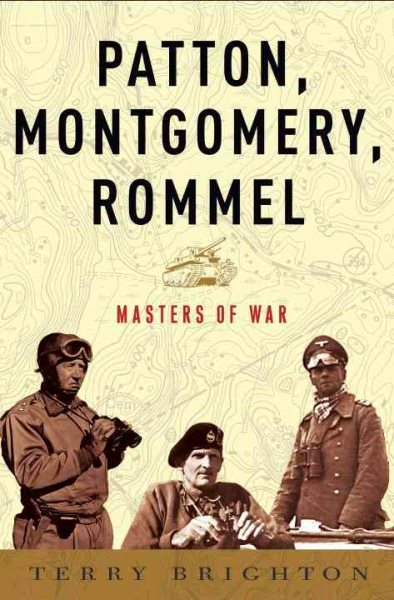 By Terry Brighton
By Terry BrightonAn account of World War II as it was experienced by three influential commanders draws on primary source materials to evaluate their explosive relationships with one another, their command talents and their enthusiasm for publicity.
(Check Catalog)
Monday, November 9, 2009
Seal Warrior: Death in the Dark: Vietnam: 1968-1972
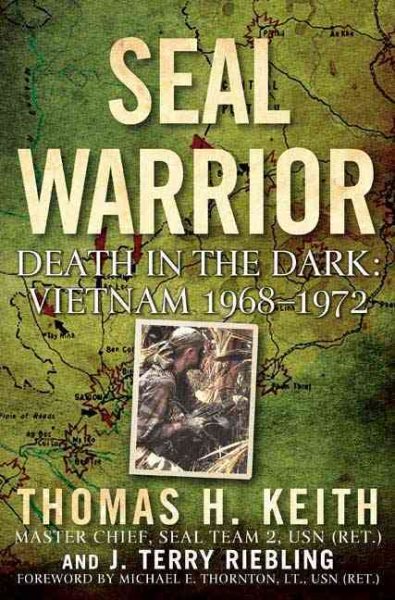 By Thomas H. Keith and J. Terry Riebling
By Thomas H. Keith and J. Terry RieblingDocuments the Vietnam tour of duty performed by a highly decorated Navy SEAL, describing his first-hand experiences with the emergence of modern guerilla warfare as well as his subsequent positive relationships with those he once fought.
(Check Catalog)
Tears in the Darkness: The Story of the Bataan Death March and Its Aftermath
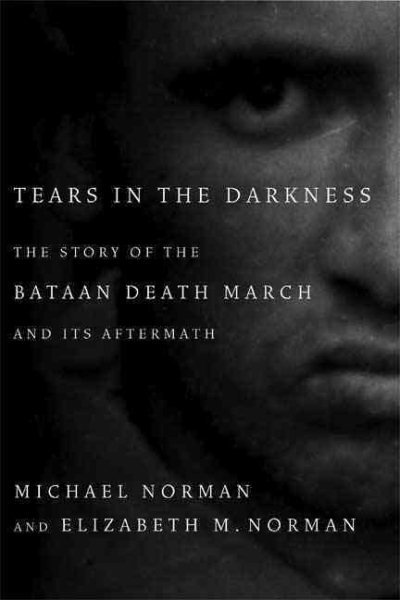 By Michael Norman and Elizabeth M. Norman
By Michael Norman and Elizabeth M. NormanFollowing the U.S. surrender to the Japanese on the peninsula of Bataan in 1942, 76,000 American and Filipino POWs began the infamous Death March. This gripping narrative, told in unsparing but sympathetic detail, focuses intermittently on American POW Ben Steele, whose sketches adorn the book, and the hell of Japanese prison and labor camps that introduced these captives to the starvation, dehydration and murderous Japanese brutality that would become routine for the next three years.
(Check Catalog)
The Shadows of Youth: The Remarkable Journey of the Civil Rights Generation
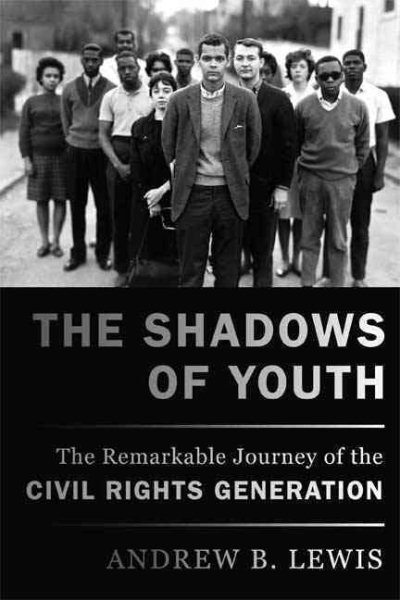 By Andrew B. Lewis
By Andrew B. LewisA group portrait of leading civil rights activists who comprised the Student Nonviolent Coordinating Committee draws on original sources to illuminate their challenges to American perspectives on human rights, politics and moral obligation.
(Check Catalog)
Monday, November 2, 2009
John Brown's Trial
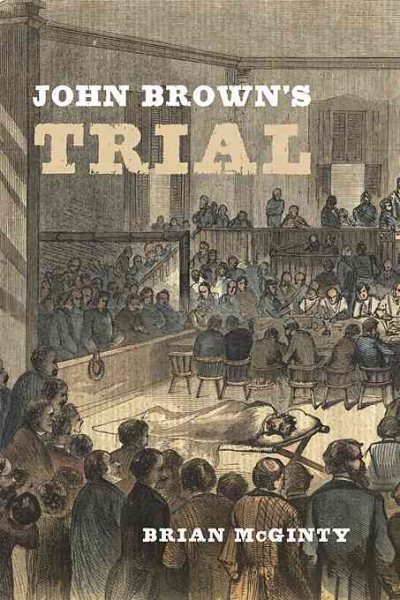 By Brian McGinty
By Brian McGintyMcGinty (Lincoln and the Court) gives us a detailed account of the trial and execution of abolitionist John Brown in 1859 for his raid on Harpers Ferry. Through studying the trial records, period newspapers, and accounts by trial participants, the author raises several important points regarding the fairness of the proceedings. First, the Commonwealth of Virginia tried Brown even though the Harpers Ferry arsenal was the property of the federal government. The prosecutor, Andrew Hunter, had had a relative by marriage who was killed by Brown's men, a factor that should have removed him from the trial. Both of Brown's original defense attorneys had witnessed the raid. After the jury returned the guilty verdict, Brown's appeals were quickly denied, and Governor Henry Wise of Virginia refused to grant clemency. In short, the government of Virginia was determined to be rid of Brown. The results, however, went against Virginia and the South: Brown's eloquent defense of his actions, denunciation of slavery, and execution transformed him into a symbol for the end of slavery.
(Check Catalog)
Leading Ladies: American Trailblazers
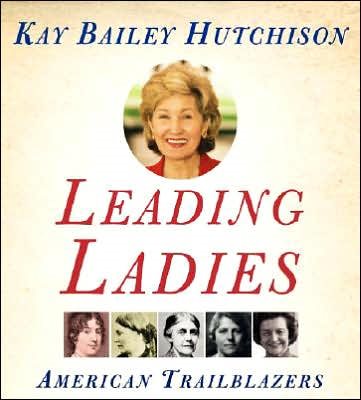 By Kay Bailey Hutchison
By Kay Bailey HutchisonIn a series of skillfully drawn biographical portraits, United States Senator and bestselling author Kay Bailey Hutchison examines the lives of sixty-three pioneers in military service, journalism, public health, social reform, science, and politics—all American women. Mixing historical portraits with modern success stories, Senator Hutchison shows how American women from all periods of history have contributed to the strength and progress of our nation. Senator Hutchison, a trailblazer herself, became the first woman from the state of Texas elected to the United States Senate.
With courage, purpose, and compassion, the women of Leading Ladies continue to blaze trails for thousands of American women to follow—and no history of the nation can be written without them.
Civil War Wives: The Lives and Times of Angelina Grimke Weld, Varina Howell Davis, and Julia Dent Grant
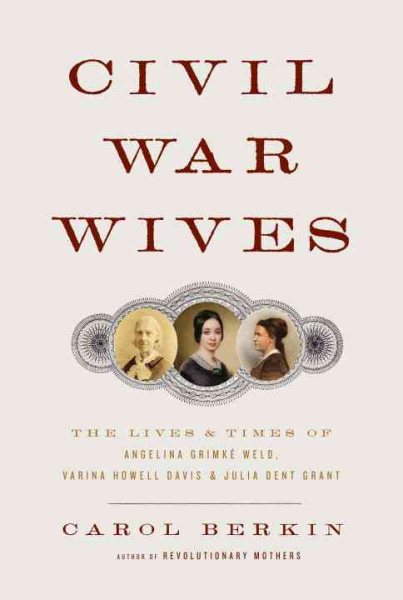 By Carol Berkin
By Carol BerkinTraces the vivid stories of the wives of Theodore Weld, Jefferson Davis, and Ulysses S. Grant to demonstrate how their personal beliefs were overshadowed by the supporting roles they played to their high-profile husbands before unique wartime and personal challenges brought their characters to the foreground.
(Check Catalog)
